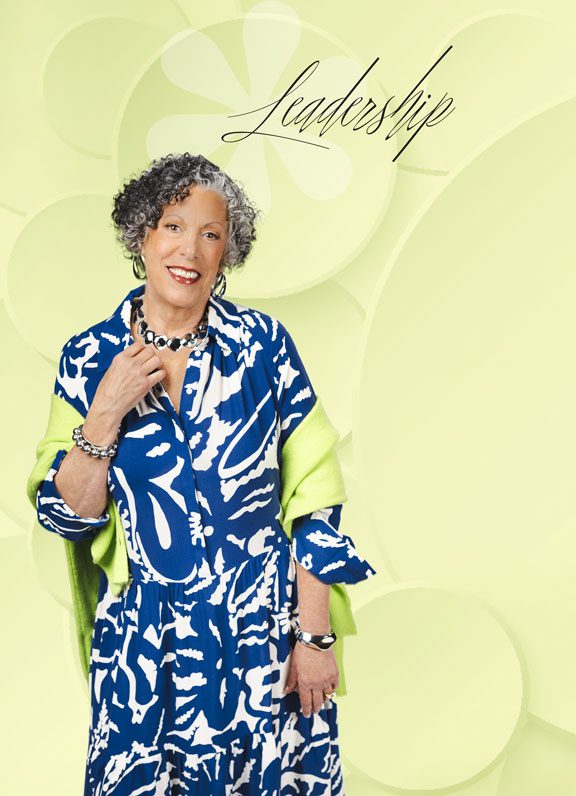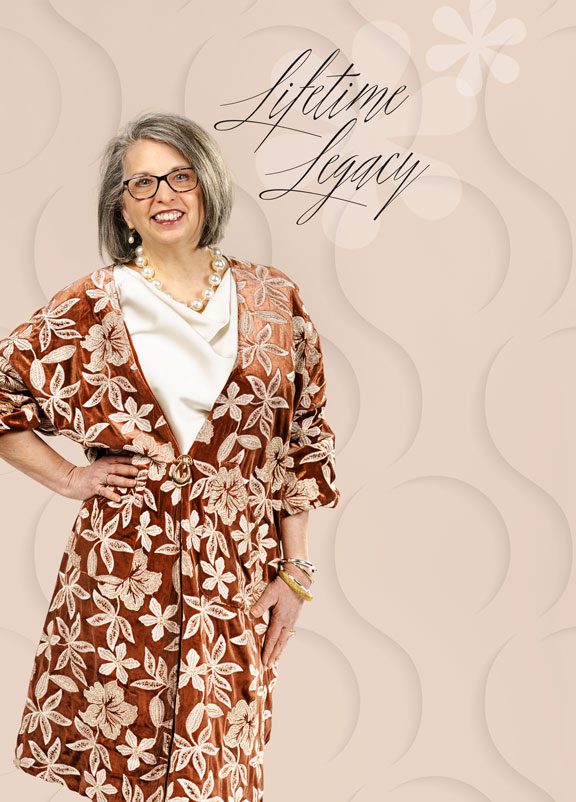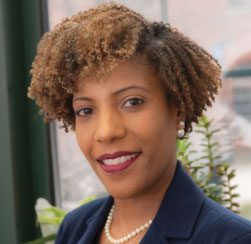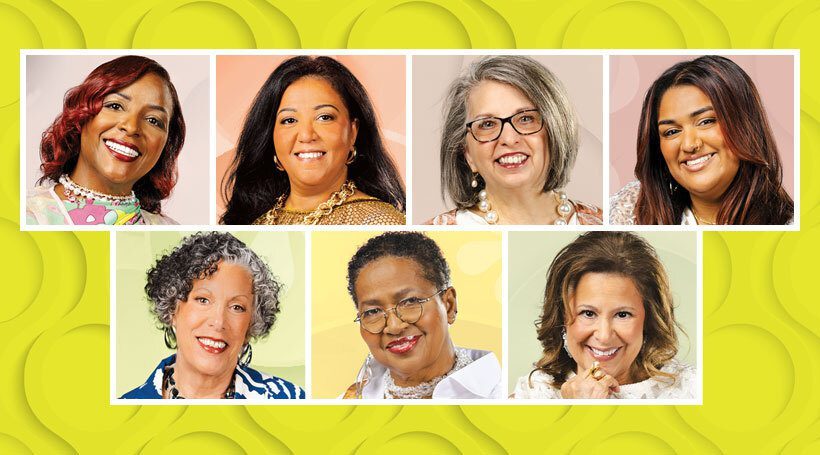
Chalice Rhodes, PhD
Business Excellence
Chalice Rhodes, PhD
Becoming a business owner was always in the cards for Chalice Rhodes, ever since her mother gave her The Babysitter’s Club Business Kit when she was a kid. But an earlier childhood experience solidified her purpose.
“When I was just a child, an older family member came to me in crisis and asked for help,” Chalice says. “I couldn’t help her. But I said, ‘That’s what I’m gonna do. I’m gonna grow up to help people.’”
That’s just what she did. But it hasn’t been easy.
Eight months after getting divorced, and in the middle of the Covid pandemic, the mother of 2 opened her private counseling practice while still working as a full-time counselor in higher education. She had always considered the idea of private practice, and when the pandemic hit, she realized people would need someone to talk to.
Then 3 weeks after opening, she was told her contract with the college would not be renewed due to the pandemic. “It was so scary,” she says.
“I was transitioning from being married for almost 16 years to being the mother of my own household, paying for my sons and I to live in our home.”
But she found her footing, winning contracts with insurance companies and spreading the word about her counseling services. And then another challenge hit.
In September of 2022, Chalice was diagnosed with non-invasive breast cancer. When her surgeon found out she was a therapist, she had an idea. “She didn’t have anybody to refer her patients to,” says Chalice. “I thought, ‘Oh, this is why I have breast cancer, because God wants me to reach back into my professional counseling career and help breast cancer survivors.’”
At the end of September, Chalice underwent a lumpectomy. The next month, she completed a certification to specialize in cancer oncology behavioral health.
Today – on top of her thriving practice – Rhodes offers 6-week online therapy groups for breast cancer survivors, has her own app called Dr. Chalice, Teach!, hosts her podcast “Talk the Wellness Tea with Dr. Chalice” and provides Diversity, Equity and Inclusion consulting.
“I turned my pain into purpose,” she says. “For anyone who’s feeling like, ‘oh my god, was this a waste of time,’ it’s not a waste of time. Everything you have accomplished thus far, you have to find a way to take it and use it to propel you forward.”

Joanne Rosen
Leadership Award
Joanne Rosen
Joanne Rosen, didn’t find her role at Samaritan. It found her.
A friend who was the organization’s executive director at the time asked her to look over the job description for a marketing role. And everything fell into place.
“I realized I really wanted the job,” she says. “My heart goes out to anybody who’s struggling or suffering in any way.
I could never be a doctor or a nurse, but I can do what I do – advocate for people who are vulnerable.”
So Rosen became Samaritan’s first director of marketing and has been with the nonprofit, which provides hospice, palliative and at-home primary care, for nearly 30 years. She now serves as the Chief Marketing & Public Affairs Officer.
Over the years, Rosen has led marketing initiatives including the expansion of services into 5 South Jersey counties, a global partnership with Kawempe Home Care, Samaritan’s sister hospice in Uganda, and the opening of The Samaritan Center for Grief Support and The Samaritan Centers in Mt. Holly and Voorhees.
“A lot of people say, ‘Oh, you work in that sad place,’” she says. “It can be sad, but we are lifting these people up, helping them and serving them.”
As Rosen and her team spread the word of Samaritan’s mission, she finds herself practicing that same core value in her leadership: lifting people up.
“Leadership is an honor, and it’s a responsibility to facilitate and encourage others to be their best,” she says. “Giving other people a chance to step up. The smartest people want to keep learning and you learn by watching people work. I like that style, I want to adopt that.”
But Joanne says she’s learned much more from Samaritan than how to be a good leader. “We say that every day is a gift, every day is a blessing and tomorrow is not promised,” she says, “so it’s important to live life to the fullest.”

Marian Tawfik
Inspiration
Marian Tawfik
When Airman First Class Marian Tawfik immigrated to the U.S. from Egypt in 2016 to escape religious persecution, one of the biggest adjustments she experienced was getting a driver’s license.
“I failed the driving test the first time,” she says. “Not because I hadn’t practiced, it was something inside me: Women are not allowed to drive where I come from. You can’t, you’re not smart enough. Now I have my car, I control where I go.”
Marian arrived in the U.S. with practically nothing, but her first years here were filled with kindness as well as challenges, she says, from being gifted a book by a complete stranger to co-workers helping her practice speaking English.
In 2021, she enlisted in the military, inspired by experiences she had with Americans in Egypt. “I remember people giving us Christmas boxes with cheese and bread,” she says. “Giving us chocolate and my first Barbie. So in my mind, America’s protecting us. With my service, I’m trying to give back.”
In a race against the clock due to the military’s age requirement, Marian put in years of hard work – covering shifts in exchange for help practicing English – to complete her training and become a member of the Air Force. But she didn’t stop there.
Marian has also spent time giving back to fellow military members by becoming actively involved in mental health initiatives at Joint Base McGuire-Dix-Lakehurst.
As a volunteer with Airman’s Attic, she supported people who were living on their own for the first time when their service ended – helping them find work, get housewares and offering someone to talk to.
She also helped establish “Sean’s Room,” a mental health program working to prevent suicide in the military. “When we opened, I had 2 people sit with me crying,” she says.
“And it’s very emotional to me to know there’s somebody close to hurting himself and in some way, maybe, something I did changed his life and he’s here now.”
Last month, Tawfik was deployed to the Middle East and hopes to return around Christmas this year.

Esther Deblinger, PhD
Lifetime Legacy
Esther Deblinger, PhD
Today, when a child is a victim of sexual abuse, they can undergo treatments that have been tested and proven to work. That’s thanks to Esther Deblinger.
“I think my parents instilled in me this desire to be a helping professional, and even indirectly, the desire to help children who experienced difficulties that were traumatic in childhood,” she says. Both of Esther’s parents suffered very difficult childhoods and lost their parents around age 12. Esther is keenly aware of the pain her parents experienced when they were young.
Decades later, while working to treat children who had suffered trauma, Esther discovered there was no evidence-based treatment model for children who had experienced sexual abuse.
She set out to change that.
Working with colleagues, Esther developed Trauma-Focused Cognitive Behavioral Therapy, an evidence-based treatment model for children, adolescents and caregivers that is now a standard of care around the world. The model is a staple for treating children suffering from PTSD and other trauma-related emotional and behavioral difficulties.
Its effectiveness has had a lasting effect.
“I had a client who I saw when she was 7,” Esther says. “She called me after all those years and wanted to discuss whether she should go to law school to be a child abuse advocate.
It was very moving.”
Esther went on to co-found Rowan Medicine’s CARES Institute (Child Abuse Research Education and Service Institute). For 35 years, she and her colleagues have provided interdisciplinary support for children who have experienced trauma and their families, receiving state and federal funding that allows children to receive services regardless of their family’s ability to pay.
“I feel a level of pride and meaning in what I do on a day-to-day basis,” she adds. “I feel very, very blessed. And I hope I’ll be able to continue to do this work for many years to come.”

Anjali Darji
Woman to Watch
Anjali Darji
When Anjali Darji got her period in middle school, she found a hoodie was her secret weapon for school days during that time of the month – it served 2 purposes: keeping her from being embarrassed if she got a blood stain on her jeans and hiding the pad she carried to the bathroom.
“I know that doesn’t seem like that big of a deal,” she says. “But for a little 12-year-old who didn’t know what she was doing, that was my whole life, and I was so anxious about it.”
When Anjali realized this wasn’t a unique situation, she decided to do some research and found herself in a world of advocacy, starting at the Alice Paul Institute (API).
“The API started everything for me,” she says. “After Covid, I was, like, socially inept, unable to speak to people. But everyone there was interested in what I had to say.”
That started Anjali on a path as a fierce advocate for gender and social justice. During her senior year of high school, Anjali joined the Executive Leadership Board of API’s Girls Leadership Council and worked with a group of girls to raise money, spread awareness and build a period pantry – where girls can get menstrual products at no cost – at the Cherry Hill Library. “It’s been almost a year and it’s still going strong,” she says, “which I’m super happy about.”
That same year, she participated in the Harvard Graduate School of Education’s Critical Participatory Action Research program. Alongside 7 other New Jersey students, Anjali conducted research on redlining practices and the lack of economic investment in New Jersey communities, presenting their findings to Harvard graduate students.
“That was super empowering,” she says. “I’m just a girl who went to some random public high school in Jersey and somehow that opportunity found its way to me.”
Today, Anjali is wrapping up her freshman year at Rutgers University and continues her advocacy as the board trustee and treasurer of Flow Forward, a nonprofit dedicated to bringing menstrual equity to New Jersey.
“At its core, activism is intervention,” she says. “I know it sounds cliche, but my point is to never give up. If you can’t join something, create something.”

Beverly Collins-Roberts
Game Changer
Beverly Collins-Roberts
For Beverly Collins-Roberts, storytelling has always driven her passion for photography, leading her to projects that, while personally fulfilling, have also brought her undeniable pain. But she will be quick to tell you that documenting stories that have been erased for centuries has to be done – no matter how painful.
While photographing Camden’s Pomona Hall in 2002, Beverly discovered a fact that had been kept under wraps for a century: Pomona Hall had been a slave plantation.
“When I finally forced myself to go up to the third floor, where enslaved people had lived, I was terrorized,” she says. “I was afraid to make a move. It felt like 1,000 souls hovering over the whole space. At that moment, I thought, ‘Don’t worry, I will tell this story.’”
But the stories of the 14 enslaved people who lived there couldn’t be found in history books. So Beverly decided to unearth them, dedicating the next 3 years to documenting the stories of slavery in the city of Camden.
In 2005, she released her documentary, “Unhushed,” detailing Pomona Hall’s horrifying history, and presented “The Still Standing Project,” a series of exhibits and events documenting Pomona Hall and other stories of African Americans in Camden. In addition, information about the hall’s history of slavery was – for the first time – added to displays at Pomona Hall.
Not long after, Beverly organized the “Still Standing Awards Ceremony for African Americans – Up Out of Camden from Slavery to Now,” recognizing 50 Black people throughout history. “It was all about the fact that Black folks who have come here against our will and were enslaved, we’re still standing,” she says. “Not only standing, we’re doing tremendous things.”
In 2022, she revamped “The Still Standing Project,” adding more stories of the African American experience, including her documentary of a 2008 trip to one of her ancestral homes, Ghana. The trip, she says, affected her much more than she first realized, and she and her husband moved to Panama to take a step back from her work. They stayed for over 6 years.
“I tucked the whole experience away in the back of my soul,” she says.
While Beverly says she’ll continue to tell these stories – she’s planning a world tour for “The Still Standing Project” – she wouldn’t want to experience her discoveries in Camden or Ghana again.
“It’s all for educational purposes, and to give America the chance to live up to the wrongs that they’ve done.” she says. “Everything was stripped, our language, our religion, our history, our food. That’s why I have told these stories and will until the day I die. It has been rewarding, yet painful.”

Gisele DiNatale
Publisher’s Award
Gisele DiNatale
When Gisele DiNatale’s daughter, Alicia, was diagnosed with a rare form of cancer at the age of 16, Gisele and her husband Mario stayed by their daughter’s side for the next 13 months as she battled her disease.
Immediately after the diagnosis, Gisele went into caretaker mode, managing treatment options, insurance information and everything that comes with a tragic diagnosis. Her role as “mother” was pushed to the side, but she quickly learned that wasn’t what her daughter needed.
Alicia needed to be a teenager. And she needed Gisele to be her mom.
“Cancer is paralyzing,” Gisele says. “I had to file it in the back of my brain every day. That was what I had to do to be the best mother I could be for her. Ok, what do we need to get done? You want to get your driver’s license? Ok. Are you going to prom? Ok, then let’s cover your head.”
So when Alicia passed away in 2002, Gisele and Mario set out to support other families with kids battling cancer and established the Alicia Rose Victorious Foundation. For over 2 decades, they’ve provided teens battling cancer with activities and spaces to help them feel more like teens while staying in the hospital.
Each year, the organization delivers 2,000 kits packed with a signature bandana pillow and items like craft projects and puzzle books, to hospitalized teens. They’ve also raised over $6 million, funded 68 teen lounges and provided 49 Alicia’s Art Carts to hospitals across the country. Recently, they donated a grant for a fertility preservation project for young people preparing for chemo.
“This foundation enables me to have a relationship with my daughter who is not here,” Gisele says. “In a way, it’s my world with Alicia. Someone said this to me and it’s so true: Her hand is all over this. We’ve been building something to give meaning to her life.”
Photography by David Michael Howarth
Shot on location at Collingswood Ballroom
Styling by Sarah Gleeson
Hair for Marian Tawfik: Frank Rizzieri/Frankie’s by Rizzieri, Collingswood
Hair for Joanne Rosen: Micah Johnson/Frankie’s by Rizzieri, Collingswood
Hair for Anjali Darji: Dolly Cecola/ Frankie’s by Rizzieri, Collingswood
Hair for Chalice Rhodes: Caniya Caldwell/Pick Up From Jessie Hair Studio by Caniya, Mt. Laurel
Makeup for Joanne Rosen, Marian Tawfik, Anjali Darji: Lindsey Hagan/Frankie’s by Rizzieri, Collingswood
Makeup for Chalice Rhodes and Beverly Collins-Roberts: Ericka Kovach
Special thanks to our Women of Excellence Selection Committee

Christie Ileto
Anchor, 6abc Action News

Bonnie Clark
Vice President, Communications &
Senior Advisor to the Managing Partner,
Philadelphia Phillies

Janell Simpson
Deputy Chief, Camden County Police

Phillip Heath
President/CEO, Samaritan

Sarah King
Vice President of Operations, Virtua

Oded Kraus
Executive Director, Katz JCC

Candice Alfonso, Esq.
Chief Diversity Officer, State of New Jersey
How honorees were selected: Over the past few months, readers nominated women they knew who were making a remarkable difference in their community or workplace. Seven prestigious leaders reviewed the nominations and selected 7 women who exemplified what it means to be excellent.














